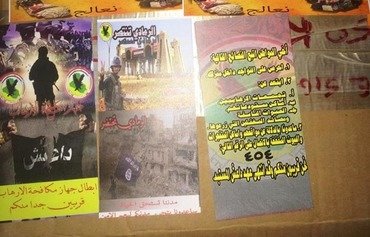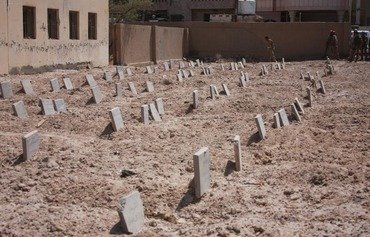Iraqi forces taking part in the operation to liberate Fallujah from the "Islamic State of Iraq and the Levant" (ISIL) have been discovering fresh evidence of the group's brutality in every neighbourhood they enter, military officials say.
This includes secret prisons, with implements used to administer physical torture, and workshops where car bombs had been rigged and missiles and improvised explosive devices (IEDs) assembled and stored.
Joint forces from the anti-terrorism agency, federal police and the popular mobilisation on Sunday (June 26th) declared they had completed the large-scale operation to liberate Fallujah, which kicked off May 22nd.
In their sweep through residential neighbourhoods, federal police announced they had found houses that ISIL had converted into secret prisons, "sharia court" headquarters and houses re-purposed as munitions workshops.
"Iraqi forces found more than a secret prison inside homes in the neighbourhoods of Nazal, al-Risala and near the Iron Bridge," said 1st Lt. Marwan Mustafa of the federal police press office.
"Every prison included different sets of steel cages," he told Mawtani.
These were dedicated variously to the people of Fallujah, ISIL elements who had fallen foul of the group, and captured members of the Iraqi security forces and those ISIL considered "apostates", he said.
"Every prison includes various means to torture prisoners and humiliate them, but the most popular method of torture observed inside those prisons were the cages designed to be only one metre in height which can fit just one prisoner in a squatting position without standing," he said.
The liberating forces also found stone chambers used for solitary confinement and group cells with secure iron doors, Mustafa said.
"Every prison has an adjacent building in the same house or in the house next door intended to be a 'sharia court' where the verdicts are issued," he said.
Documents discovered at these so called courts of law have been filed with the Iraqi authorities to be used as "criminal evidence against elements of the organisation", he added.
'Exporters of death'
"The signs of death and horror left by ISIL in Fallujah did not only include the secret prisons and mass graves," popular mobilisation leader Sami al-Masoudi told Mawtani. "They also left behind large complexes for the manufacturing of car bombs and IEDs that exported death to other cities and provinces of Iraq."
"In every locality or alley, ISIL left a prison or a workshop to manufacture or store explosives and booby-trapped cars," al-Masoudi said. "They have planted death everywhere in Fallujah."
"Secret prisons were not the only part of that organisation's frightening reality," he said, noting the recent discovery of several mass graves containing the bodies of the victims of ISIL prisons in Saqlawiyah, al-Shuhada and al-Hayakel.
"We were surprised, while searching the residential areas, when we found a large complex for the manufacturing of explosives near Fallujah General Hospital," he said.
The complex had been used for rigging car bombs and customising sniper rifles, and contained sophisticated equipment, he said. Highly explosive compounds such as TNT and C-4 had been stored in adjacent warehouses.
"This compound and other explosive workshops were used to export car bombs and IEDs to Baghdad and other safe Iraqi cities in the centre and south of the country," he said.
Documents relating to ISIL's organisational structure found in Fallujah indicate that the group's leaders in that city oversee its cells in central and south Iraq, he said, and that munitions made inside the city were being exported to them.
Mayor of Fallujah Issa al-Issawi told Mawtani he was pleased that the security forces had seized ISIL's prisons and workshops before the group could use them to commit more crimes against innocent civilians.
"Fallujah is liberated today from the control of a gang ruling with iron and fire and one that was killing its innocent people and violating their rights before killing the rest of the Iraqis," he said.

![Iraqi police examine prisons in Fallujah that were discovered recently after security forces launched the military operation to liberate the city from the 'Islamic State of Iraq and the Levant'. [Photo courtesy of the Iraqi Federal Police]](/cnmi_di/images/2016/06/29/5702-fallujah-prisons-iraq-600_384.jpg)





